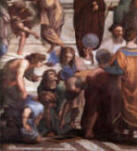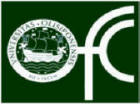
|
|
|

Photomontage by Bartek Malysa.
Frontispiece courtesy of the Department of Printing and Graphic Arts,
Houghton Library, Harvard College Library (Typ 620.47.452F) Il est une proposition qu'on peut formuler sans réserve et que la suite de cet écrit justifiera: cette oeuvre [d'al-Bitruji] qui n'est qu'une tentative et qui ne s'achève pas, aura la plus grande influence sur l'évolution de l'Astronomie occidentale. Cette influence, nous la reconnaîtrons partout et pour toujours, côtoyant celle qu'exerce la doctrine de Ptolémée, la contrariant et l'empêchant de ravir l'acquiescement unanime des astronomes. Le perpétuel conflit de ces deux influences entretiendra le doute et l'hésitation à l'égard de chacune d'elles; il ne permettra pas aux intelligences d'être asservies par l'empire incontesté de l'une ou de l'autre d'entre elles; il assurera aux esprits curieux la liberté de recherche sans laquelle la découverte d'un nouveau système astronomique fût demeurée impossible. (Duhem, Le Système du Monde, volume II, p. 171) |
THE UNITY OF SCIENCE
IN THE ARABIC TRADITION
Science, Logic, Epistemology and their Interactions
Institut Franco-Portugais de
Lisbonne, Portugal
Scientific & Organizing Committee
- Shahid
Rahman, Professor of Logic and Epistemology at the University
of Lille 3 - France
For further
information please contact CFCUL by e-mail to:
cfcul@fc.ul.pt
|
Theme of the Colloquium
|
In his The Structure of Scientific Revolutions, Kuhn develops a non-cumulative conception of the development of science. Indeed, in his view not only has the Copernican model introduced a major discontinuity in the history of science but the new paradigm and the old paradigm are incommensurable i.e. the gap between the two models are so huge that the changes introduced in the new model cannot be understood in terms of the concepts of the old one. By gathering several recent studies on Arabic Science, Logic and Epistemology, the aim of the colloquium is to examine to what extent the study of the Arabic tradition can bridge the gap assumed by Kuhn as a historical fact. It will give the world's leading scholars and experts the opportunity to discuss, in the light of new recently obtained results, the validity of Kuhn's thesis, the relevance of traditional dichotomies: Western/Eastern thought, modern/ancient science, and so on and to explore new lines of research aimed at providing a better explanation of the development of science as whole. In this general context, one of the main reasons of holding the colloquium is to promote the dialogue between some of the authors of the volume The Unity of Science in the Arabic Tradition (edited par Rahman, Street and Tahiri, Springer 2008, xiii - 390 pp.) and to open the discussion with experts in their respected field. The discussion of the contributors to the volume and the new communications should therefore be conducted in the context of the emergence of a new interpretation of the historical role played by the Arabic tradition in the development of science. Based on new historical evidence, this newly emerging interpretation argues that Arabic scientific practice was originally developed as a countermodel by attempting to put to the test the Greek scientific discourse and its emergence as a countermodel was closely linked to the normative status traditionally accorded to controversies in Arabic culture. |
We start by observing reality... we try to select solid (unchanging) observations that are not affected by how we perceive (measure) them. We then proceed by increasing our research and measurement, subjecting premises to criticism, and being cautious in drawing conclusions... In all we do, our purpose should be balanced not arbitrary, the search for truth, not support of opinions. Hopefully, by following this method, this road to the truth that we can be confident in, we shall arrive at our objective, where we feel certain that we have, by criticism and caution, removed discord and suspicion. Yet we are but human, subject to human frailties, against which we must fight with all our human might. God help us in all our endeavors. (Ibn al-Haytham, Kitab Al-Manadhir or The Book of Optics, pp. 5-6)
|
|
|
|
|
Dans The Structure of Scientific Revolutions, Kuhn développe une conception non-cumulative du développement de la science. En effet pour lui, une théorie scientifique "révolutionnaire" non seulement introduit une discontinuité majeure dans l'histoire des sciences mais le nouveau et l'ancien paradigme sont incommensurables i.e. l'écart entre les deux modèles est tel que les changements introduits dans le nouveau modèle ne peuvent pas être compris en termes des concepts de l'ancien modèle. En réunissant plusieurs études récentes portant sur la science, la logique et l'épistémologie arabes, le but du colloque est d'examiner dans quelle mesure l'étude de la tradition arabe peut combler le fossé supposé par Kuhn comme étant un fait historique. Il permettra aux chercheurs et aux experts, de réputation mondiale, de discuter, à la lumière de nouveaux résultats obtenus récemment, la validité de la thèse kuhnienne, de la pertinence des dichotomies classiques : pensée occidentale/pensée orientale, science moderne/science ancienne, etc. et d'explorer éventuellement de nouvelles pistes de recherche visant à offrir une meilleure explication du développement de la science dans sa globalité. Dans ce cadre général, l'une des raisons majeures de la tenue du colloque est de favoriser le dialogue entre les auteurs du volume The Unity of Science in the Arabic Tradition (édité par Rahman, Street et Tahiri, Springer 2008, XIII - 390 p.) et d'ouvrir la discussion à des experts en la matière. La discussion des contributions publiées ainsi que les nouvelles communications devraient ainsi se dérouler dans le contexte de l'émergence d'une nouvelle interprétation du rôle historique joué par la tradition arabe dans le développement de la science. Celle-ci met en évidence la thèse suivant laquelle la pratique scientifique arabe s'est en fait construite à l'origine comme contre-modèle en cherchant à mettre à l'épreuve le discours scientifique grecque et que son émergence en tant que contre-modèle est étroitement liée au statut normatif que revêtaient traditionnellement les controverses dans la culture arabe. |
The seeker after truth is not he who studies the book of his predecessors and gives a free rein to his natural disposition to regard them favourably. But rather he... who follows proofs by argumentation (الحجّة) and demonstration (البرهان) rather than the assertions of a man whose natural disposition is characterised by all kinds of defects and shortcomings. It is the duty of he who studies scientific books, if his aim is to know the [real] facts (معرفة الحقائق), that he should turn himself into an opponent of everything that he studies... If he takes this course, the [real] facts (الحقائق) will be revealed to him, and the possible shortcomings and flaws of his predecessors' [scientific] discourse (كلام من تقدمه) will stand out clearly. (Ibn al-Haytham, Al-Shukuk, pp. 3-4) |
Programme
|
29 Octobre 2009
14.30h - 15h -
Welcoming
Session
Moderator: M. Roshdi Rashed
Ahmad Hasnaoui (Fellow Researcher at the CNRS, Paris-France)
SUMMARY. Avicenna (Ibn Sina, d. 1037) devotes two chapters of al-'Ibara to the quantifiation of the predicate. Al-'Ibara is the third book of the logical collection of his philosophical encyclopedia entitled al-Shifa' (The Cure). Avicenna's treatment of the quantification of the predicate has the following distinctive features : 1) he deals systematically of singular and indefinite propositions; 2) he states correctly the contradictories of the eight proposition forms which he enumerates; 3) he is aware of the equivalence between two of these forms but makes no attempt to reduce the number of these forms to basic ones. It is suggested that Avicenna thought of the logic of doubly quantified propositions on the model of propositions with an indefinite predicate (S is not-P). Contrary to his predecessors, Avicenna did not reject a priori these proposition forms and he countered the arguments supporting such a rejection.
15h45 - 16h Discussion
Hassan Tahiri (Fellow Researcher at the CFCUL, Lisboa-Portugal)
SUMMARY. We will present two types of dialogue on the same topic which reveal some of the shortcomings in scientific and historical practices that have nasty epistemological consequences. The first, between Kuhn and Lakatos, which fails to get started due to a communication failure and the second, between Kuhn and Duhem, which represents an ignored historical case of a successful communication. The breakdown of talks between the historian and the philosopher shows that the basic criterion for the possibility of a dialogue is the interaction between arguments of the two parties while Duhem's vindication which turns out to be the final outcome of the Kuhn-Duhem successful dialogue is still widely ignored due to a global communication failure.
16h45 - 17h Discussion
Coffee break
|
|
30 Octobre 2009
Moderator: M. Michel Paty
Ahmed Alami (President of the Department of Philosophy at the University of Kenitra, Morocco)
SUMMARY. L'extraordinaire développement qu'a
connue la civilisation arabe aux temps des Omeyyades et
Abbassides n'a pas était seulement au niveau matériel :
conquête de nouveaux territoires, expansion du commerce,
extension des villes, etc. Il a également touché les
sciences. De nouvelles sciences voient le jour dans la
civilisation arabe, telles que les sciences de la langue,
les sciences religieuses et les sciences dites
rationnelles. Mais ces types de sciences n'ont pas
coexistées sans heurts. En fait, comment lier toutes ces
sciences disparates et hétérogènes ? Comment trouver le
lien qui soude les sciences religieuses et les sciences
rationnelles dites des anciens, ou sciences des grecques
? Deux positions se sont constituées. D'une part, celle
qui considère qu'il n'y a pas de lien entre ces sciences.
En réalité, cette position regroupe plusieurs courants.
Il y a les courants orthodoxes qui estiment que les
sciences religieuses se suffisent à elles mêmes. La foi
comme telle n'a besoin d'aucune science auxiliaire. Mais
il y a aussi la position des linguistes et en général
les spécialistes de la langue qui estiment que la
maîtrise de la langue et de ses sciences les dispensent
de toutes les autres sciences, surtout des sciences
dites rationnelles. D'autre part, il y a la position de
ceux qui estiment que nulle science ne peut être
indépendante et autonome. Toutes les sciences quelles
que soient leurs origines, leurs supports, leurs
méthodes, sont liées et établissent des rapports
complémentaires. Cette communication a pour but de
présenter comment Ibn Hazm (384-456H/994-1046),
théologien andalou, réfute les arguments des ennemis de
l'unité des sciences et comment il construit une
argumentation solide et claire en faveur d'une unité et
d'une complémentarité de tous les types de sciences.
10.15h - 10h30 Discussion 10.30h - 11.15h - Découvrir et démontrer : l'exemple d'al-Sijzi Pascal Crozet (Directeur du Laboratoire de Philosophie et d'Histoire des Sciences (UMR 7219), CNRS, Paris-France)
11.15h - 11h30
Discussion
Coffee break 12h - 12h45 - Modernité mathématique et tradition arabe Roshdi Rashed (Director Emeritus of Research at the CNRS, Paris-France)
12h45 - 13h Discussion
Lunch Break
Moderator: M. Ahmad Hasnaoui
Catarina Belo (Professor of Islamic Philosophy at the American University in Cairo, Egypt)
SUMMARY. This talk examines Avicenna's and Averroes' conception of causality in the natural world. While the influence of Neoplatonism and Aristotle respectively is undeniable, in particular in their acceptance of secondary causality, which was opposed by the Ash‘arite school of theology, a closer scrutiny reveals marked differences on the role of specific causes. Both philosophers accept the fourfold Aristotelian division of causality in nature but stress certain causes in the account of natural phenomena, Avicenna privileging the efficient, Averroes the final cause. This divergent explanation of natural change is in line with their metaphysical worldview, as we find a mechanistic and rather modern account of natural phenomena in Avicenna and a teleological and more Aristotelian approach in Averroes.
15.15h - 15h30 Discussion 15.30h - 16.15h - Remarques comparatives sur la démonstration et l'invention dans l'accroissement des connaissances Michel Paty (Directeur de recherche émérite au CNRS, EQUIPE REHSEIS-Laboratoire de Philosophie et d'Histoire des Sciences-UMR 7219, Paris-France)
SUMMARY. We shall first pay attention to what is
called demonstration in general, trying to characterize
it and to situate its connection to the idea of theory;
we shall consider as well some other notions such as
intuition, invention and creation. We shall then focus
on the dynamical nature of science, manifested indeed by
their movement in history, but also in the very work of
scientists, regarding mathematics as well as natural
sciences (including physics), and that as far as we go
back in the history of thought. These sciences are in
becoming, as Cavaillès wrote for mathematics. The idea
of demonstration itself has changed in our conceptions,
since it does not limit itself to justify in reason,
mais contributes especially in the exploration of the
area under study, which reveals new aspects of the
latter. We will show how it is bound up with the idea of
creation and with that of intuition, invoking the
respective roles in the rational thought of the two
modalities, the analytical and the synthetic ones. These
considerations are supported by case studies taken in
different periods of the history of science, in
mathematics, in astronomy and in physics. Comparative
study of such cases permits to identify patterns of
constancy and of variation in these relationships.
Concerning physics, we shall ponder on the relationship
between experiment and demonstration, as well as on the
proper characters of physical concepts as magnitudes
endowed with mathematical expression and with proper
meaning content.
16.15h - 16h30
Discussion
Coffee break 17h - 18.30h - Round Table (all speakers plus Shahid Rahman (Lille III), Olga Pombo (CFCUL)
|
Speakers
Ahmed Alami is President of the Department of Philosophy at the University of Ibn Tofail in Kenitra, Morocco. Among his numerous publications, L'ontologie modale: Étude de la théorie des modes d'abu Hashim al-Gubba'i, Paris, Vrin, 2001, "La théorie des modes d'être chez les théologiens ash'arites et mu'tazilistes", in Critiquer n° 77, 2003 and "Deleuze et Avicenne", Chimères n° 31, 1997, pp. 73-87.
Catarina Belo, D. Phil. (2004) in Oriental Studies, University of Oxford, is Assistant Professor of Philosophy at the American University in Cairo, Egypt. She has published on Islamic philosophy, in particular Avicenna and Averroes and their physics and metaphysics; her latest book: Chance and Determinism in Avicenna and Averroes, Brill Academic Publishers, 2007; she is currently preparing a translation of the Pseudo-Aristotle's Theology of Aristotle into Portuguese, as well as several articles in medieval philosophy for international journals.
Pascal
Crozet is a senior researcher at the cnrs and
specialist of Arabic science. His research areas are the
history of geometry in the ninth to the eleventh
centuries and the history of science in Egypt in the
nineteenth century. He has widely published on Arabic
science, his latest book is Les Sciences Modernes En
Egypte - Transfert Et Appropriation 1805-1902,
Librairie Orientaliste Paul Geuthner, 2009 , he is
currently a coeditor of Traduire, Transposer,
naturaliser : la formation d'une langue scientifique
moderne hors des frontières de l'Europe au XIXe siècle,
éd. Pascal Crozet & Annick Horiuchi (forthcoming).
Ahmad Hasnaoui is a Researcher at the French Centre National de la Recherche Scientifique (CNRS), Paris. His research areas are Avicennian Natural Philosophy, History of Arabic Logic and the Greco-Arabic translation movement. Among his numerous publications: "La définition du mouvement dans la Physique du Shifā' d'Avicenne", Arabic Sciences and Philosophy 11 (2001); "Topic and Analysis: The Arabic Tradition" in R. W. Sharples, Whose Aristotle? Whose Aristotelianism?, Aldershot, 2001.
Michel Paty is Directeur de recherche émérite at the CNRS-Université Paris 7 and Professor visitante, Faculdade de Filosofia, Letras e Ciências Humanas, Universidade de São Paulo, Brésil. He won many prizes and he is a member of many academic societies. Among his many publications, we mention in particular : La Physique du XXe siècle (Sciences & Histoires), Les Ulis, EDP-Sciences, 2003. (portuguese translation 2007) ; Albert Einstein, ou la création scientifique du monde, Collection «Figures du savoir», Belles Lettres, Paris, 1997, 156 p. Deuxième tirage, 2004 ; D'Alembert ou la raison physico-mathématique au siècle des Lumières, Collection «Figures du savoir», Les Belles Lettres, Paris, 1998, 207 p. Deuxième tirage, 2004. (portuguese translation 2005). Forthcoming: Einstein, les quanta et le réel. Critique et construction théorique.
Roshdi Rashed is currently an Emeritus Research Director (Classe Exceptionnelle) at the CNRS- Université Paris 7 (France), an Honorary Professor at the University of Tokyo (Japan) and an emeritus professor at the University of Mansoura (Egypt). Among his many publications on the history of science and philosophy: An Encyclopedia of the History of Arabic Science (3 volumes, Routledge, 1996), Les Mathématiques infinitésimales du IXe au XIe siècle, 5 vol. (al-Furqān Islamic Heritage Foundation, 1993-2006) and Geometry and Dioptrics in Classical Islam, (al-Furqān, 2005). Forthcoming: Diophante : Les Arithmétiques, Livres I, II, III (en collaboration avec A. Allard). Edition, traduction et commentaire (Les Belles Lettres).
Hassan Tahiri is currently a Fellow Researcher at CFCUL and UMR8163 «Savoirs, Textes, Langage», University of Lille 3. His research interests are the logic of argumentation and the history of science. He recently edited, in collaboration with Tony Street and Shahid Rahman, The Unity of Science in the Arabic Tradition, Springer, 2008 to which he contributed the following paper: "The Birth of Scientific Controversies: The dynamic of the Arabic Tradition and its Impact on the Development of Science - Ibn al-Haytham's challenge to Ptolemy's Almagest".





